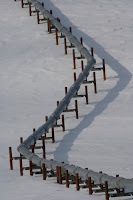Don’t say the Oilholic did not tell you so after his Indian adventure – that India will find it very hard to match Europeans on censuring Iran in ‘crude’ terms! An interesting newswire copy from the Indo-Asian News Service (IANS) as cited by broadcaster NDTV notes that in fact, India is set to step up its energy and business ties with Tehran.
The news emerges in wake of an attack earlier this month on an Israeli diplomat carried out barely yards from the Indian Prime Minister’s residence in Delhi, for which Isreal is blaming Iran. It shows you how ‘crude’ the Delhi-Tehran ties are. The blogosphere is rife with news that it is becoming increasingly difficult for Indian oil companies to pay their Iranian counterparts in wake of international sanctions which hamper processing of international payments and place limits on what the central bank - Reserve Bank of India (RBI) - can or cannot do. Well placed sources suggest that various options from routing payments via Turkey and in suitcases are being trialled.
Pragmatically speaking, few can blame India for not curtailing ties with a country which supplies 10% of its crude imports. The Iranian situation coupled with the geopolitical influence of other events in Nigeria and Sudan alongside a Greek rescue and the Chinese Central bank’s cut of the required reserve ratio of its domestic banks (on Saturday to ease borrowing) have all come together to introduce bullish trends.
The crude price is currently at an 8-month high; when last checked @13:45GMT on Feb 23rd – the ICE Brent forward month futures contract was at US$124.33 per barrel and WTI was at US$106.33 per barrel. Three City analysts told the Oilholic this morning that the strong upside rally in the oil market is likely to continue for some time yet. Additionally, in a note to clients JP Morgan Chase raised its 2012 price forecast for Brent crude by US$6 to US$118 a barrel and its 2013 forecast by US$4 to US$125 a barrel.
Meanwhile, former UK Chancellor of the Exchequer Lord Lamont – who is now the Chairman of the British-Iranian Chamber of Commerce – recently told BBC Radio 4 that imposing economic sanctions on Iran will not work.
"I can only say we are banging our heads against a wall with this approach...Iran will not buckle under these sanctions. The effect of sanctions is to hit the private sector in Iran, drive companies bankrupt and drive them into the arms of the government, or into the hands of the Revolutionary Guards and into alliances with people in the government smuggling the goods they desperately need," he said.
"I'm not sure this will have the right effect. Could this produce regime change? It's possible but in my view it's just as likely that it will bolster the strength of the regime," Lord Lamont concluded. According to the BBC, data compiled by companies exporting to Iran show that direct trade dropped from just under £500 million in 2008 - to an estimated £170 million in 2011. Blimey – didn’t know we had that much bilateral trade in the first place!
Moving away from what a former UK Chancellor said, an Indian wire reported and the Oilholic ranted about, it is time to discuss some interesting bits of reading material. This humble blog’s rapidly rising North American fan base (to put it modestly) would be keen to know that Reuters’ very own resident Oilholic – Tom Bergin’s splendid book on BP’s Macondo fiasco and its corporate culture – Spills and Spin: The Inside Story of BP – saw its US edition launched earlier this week.
Here’s the review, and if you lot in the US haven’t been cheeky and ordered a UK copy from an internet retailer, the Oilholic would recommend that you visit you a friendly neighbourhood bookstore (or library) where you are likely to find a local edition. From Bergin’s book which raises serious questions on corporate ethics to a Pastor who raises a rather pious question for us all really - Where would Jesus Frack?
According to the Pittsburgh Tribune Review, a pastor told environmentalists last month that there is a scriptural basis for opposing Marcellus Shale drilling in the US. The Rev. Leah Schade, pastor of the United in Christ Church in Union County, Pennsylvania, USA, wore a hand-sewn white patch that said, "WWJF - Where Would Jesus Frack?" and dropped to her knees to demonstrate the power of prayer.
Asked later to answer the question on her blouse, Schade said, "I don't believe Jesus would be fracking anywhere." She cited Genesis 2;15: "God put human beings into the Garden to till it and keep it, not drill and poison it." Amen!
Continuing with interesting things to read, finally here is a comparison drawn by BBC journalist Vanessa Barford on what are the competing claims of UK and Argentina over the Falkland Islands – an old diplomatic spat which has recently acquired a crude dimension. Last but not the least, here is a video of yours truly on an OPEC broadcast discussing project investment by the cartel at its 160th meeting of ministers in December. That’s all for the moment folks! Keep reading, keep it 'crude'!
© Gaurav Sharma 2012. Photo I: Veneco Oil Platform © Rich Reid - National Geographic. Photo II: Front Cover (US Edition) – Spills and Spin © Random House Publishers.
.jpg)




